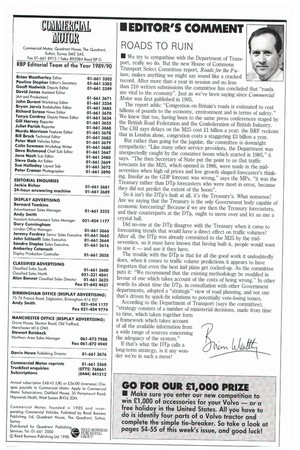INEDITOWS COMMENT
Page 5

If you've noticed an error in this article please click here to report it so we can fix it.
ROADS TO RUIN
We try to sympathise with the Department of Transport, really we do. But the new House of Commons Transport Select Committee report, Roads for the Future, makes anything we might say sound like a cracked record. After more than a year in session and no less than 210 written submissions the committee has concluded that "roads are vital to the economy". Just as we've been saying since Commercial Motor was first published in 1905.
The report adds: "Congestion on Britain's roads is estimated to cost billions of pounds to the economy, environment and in terms of safety." We knew that too, having been to the same press conferences staged by the British Road Federation and the Confederation of British Industry. The CBI says delays on the M25 cost 2 billion a year; the BRF reckons that in London alone, congestion costs a staggering £3 billion a year.
But rather than going for the jugular, the committee is downright sympathetic: "Like many other service providers, the Department was unexpectedly caught by the consumer boom which started in 1985," it says. "The then Secretary of State put the point to us that traffic forecasts for the M25, which opened in 1986, were made in the midseventies when high oil prices and low growth shaped forecaster's thinking. Insofar as the GDP forecast was wrong," says the MPs, "it was the Treasury rather than DTp forecasters who were most in error, because they did not predict the extent of the boom".
So it isn't the DTp's fault at all, it's the Treasury's. What nonsense! Are we saying that the Treasury is the only Government body capable of economic forecasting? Because if we are then the Treasury forecasters, and their counterparts at the DTp, ought to move over and let us use a crystal ball.
Did no-one at the DTp disagree with the Treasury when it came to forecasting trends that would have a direct effect on traffic volumes? After all, the DTp was already committed to the M25 by the midseventies, so it must have known that having built it, people would want to use it — and use it they have.
The trouble with the DTp is that for all the good work it undoubtedly does, when it comes to traffic volume predictions it appears to have forgotten that even the best laid plans get cocked-up. As the committee puts it: "We recommend that the existing methodology be modified in favour of one which takes account of the costs of being wrong." In other words its about time the DTp, in consultation with other Government departments, adopted a "strategic" view of road planning, and not one that's driven by quick-fix solutions to potentially vote-losing issues.
According to the Department of Transport (says the committee), "strategy consists of a number of ministerial decisions, made from time to time, which taken together form a framework which takes account of all the available information from a wide range of sources concerning the adequacy of the system."
If that's what the DTp calls a long-term strategy, is it any wonder we're in such a mess?














































































































